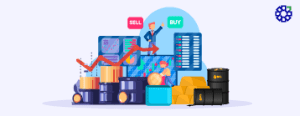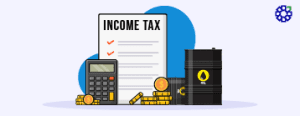What are Commodity Options?
- 20th August 2025
- 12:00 AM
- 5 min read
Want to trade the most essential resources in the world without holding them physically? Commodity options allow you to do it by offering hedging opportunities without any margin payment.
Commodities, such as gold, witnessed more than 26% annual growth in 2024. This highlights that investing in commodities in different ways can help you gain substantial returns.
This blog provides a clear guide on what is commodity options, how they work, the advantages, and more information for beginners.
What Does Commodity Trading Options Mean?
Commodity options are derivative contracts which give you the right but not the obligation to buy and sell an underlying commodity futures at predetermined prices on a particular expiry date.
The buyer has the right but not the obligation to exercise the contract. Hence, they can either exercise the contract or let it expire. Buyers pay a premium in options contracts.
In India, market regulators allow options trading in the commodity futures market. It does not allow trading in the commodity spot market because in India, the state governments regulate the spot or cash market in commodities. However, the Securities and Exchange Board of India (SEBI) only regulates the commodity derivatives market.
How Do Options for Commodities Operate?
To understand how commodity options work, let us use an example of a call option.
Suppose you believe the prices of one-month gold futures will fall, which are currently trading at INR 1200 per lot. You enter into a one-month Gold Call Option with a strike price of INR 900 and pay a premium of INR 20 to the seller. Now, on the contract expiry date, there can be 2 possible scenarios:
Scenario 1
Your bet goes right, and the current price of 1-month gold futures trades drops to INR 1000. Hence, it remains higher than INR 900. You can exercise your right and make a profit of INR 100.
Scenario 2
The market price of one-month gold futures drops lower than the strike price of INR 900, to INR 900. In this scenario, you can choose not to exercise the contract to buy gold futures at the strike price. You will let the contract expire worthless by not exercising it. Your only loss will be the premium of INR 20 you have paid to the seller.
Different Types of Commodities You Can Trade as Options
Now that you have understood the commodity options meaning, you must know the different types of commodities you can trade as options:
-
Metals
Some of the metal commodities are gold, silver, copper, and platinum. You can trade gold futures in market turbulence due to its reliability and transferable value. This allows you to hedge against inflation or currency depreciation.
-
Agriculture
Some common examples of agricultural commodities are soybeans, wheat, corn, cocoa, coffee, rice, and many others. If you invest in agricultural products, you can benefit from the rising agricultural commodity prices due to population increase and restricted agricultural supply.
-
Energy
You can also trade on energy commodities like crude oil, natural gas, and gasoline. Since there is a decrease in oil supplies, the demand for energy products has increased.
For trading commodity options in both energy, metals, and agriculture, you can open a trading account with the PL Capital Group – Prabhudas Lilladher application. PL offers real-time market scanners for insightful pre-trading analysis.
Advantages of Commodity Options Trading
-
No Market Margins
Commodity options do not require market margin since buyers have to pay a premium to purchase commodity options.
-
Risk Minimisation
Commodity options trading is less risky than commodity futures, since a buyer may not choose to exercise the contract if it is a loss-making scenario. However, futures contracts include a mandatory exercise of the contract.
-
Hedging Advantage
You can benefit from the price volatility in both directions and hedge against pricing risk.
Final Thought
Commodity options are financial contracts in which commodities are underliers. You can trade a commodity options contract for gold, silver, crude oil, or zinc at a strike price on a future date. The primary benefits of commodity options are hedging, no margin payment, and risk minimisation.
Download the PL Digi Trade application to trade commodity options with a lot of features, like an advanced option chain and access to real-time domestic and international commodity news.
Frequently Asked Questions
1. What does trading in commodity futures mean?
A commodity futures contract is a contract to buy or sell a commodity at a fixed price at a particular future date. The price and quantity of the commodity are set while making the agreement.
2. Do commodities have options?
Yes, commodity options are available in two Indian exchanges. These are the Multi-Commodity Exchange (MCX) and the National Commodity & Derivatives Exchange Limited (NCDEX).
3. How are commodity options traded?
You have to open a commodity trading account with a broker to trade commodity options. As a buyer, you have the right but not the obligation to exercise the contract. If you believe the contract is profitable before expiry, you can either exercise it or let it expire worthless.





